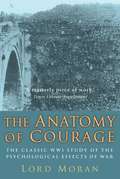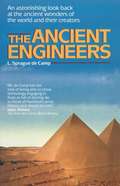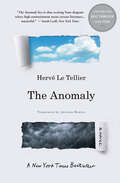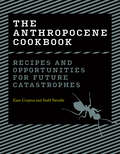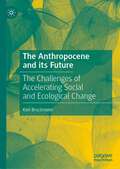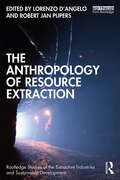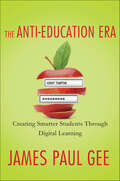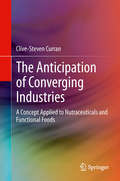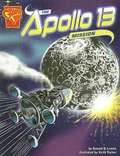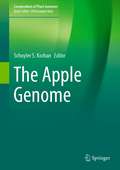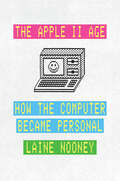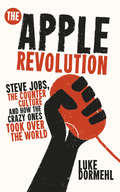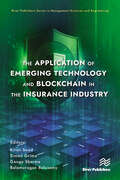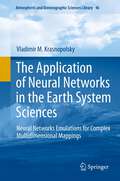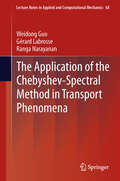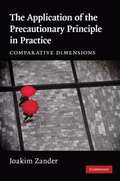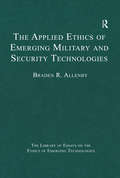- Table View
- List View
The Anatomy of Courage: The Classic WWI Study of the Psychological Effects of War
by Lord John Moran'A remarkably human book . . . arresting, and sometimes even unforgettable' Desmond McCarthy, Sunday Times'A fascinating book . . . It is not easy to do justice to Lord Moran's discursive brilliancy . . . a masterly piece of work' Times Literary Supplement'I set out to find how courage is born and how it is sustained in a modern army of a free people. The soldier is alone in his war with terror and we have to recognise the first signs of his defeat, that we may come in time to his rescue' LORD MORANDuring the First World War, Lord Moran served as a medical officer in the Royal Fusiliers for two-and-a-half years. He won the Military Cross and the Italian Silver Medal for Valour. During these years in the trenches he watched closely the soldiers' conduct under stress. The Anatomy of Courage is his sensitive and scientific study of fear and anxiety. First published in 1945 this early, ground-breaking account of the psychological effects of war, recounted by means of vivid first-hand observation and anecdote, came at a time when shell-shock was equated with lack of moral fibre. In 1940, Moran became Churchill's doctor and his position as a one of history's most important war physicians was secured. His humane, considered observations, scientific analysis and proposed solutions constitute one of the great First World War sources. However, they are perhaps just as relevant to our own conflict-ridden times.
The Ancient Engineers: An Astonishing Look Back at the Ancient Wonders of the World and Their Creators
by L. Sprague de CampThe Pyramids of Giza, the Parthenon of Greece, the Great Wall of China, the Colosseum of Rome. Today, we stand in awe before these wonders of the ancient world. They hold our history and the deepest secrets of our past in their hidden recesses. In The Ancient Engineers, L. Sprague de Camp delves into the heart of the mystery. He introduces us to the master builders who had the vision, the power, and the passion to reach for the clouds and touch the heavens. We share in some of the greatest technological triumphs of all time--triumphs of the human mind, imagination, and spirit.
The Andromeda Evolution
by Michael Crichton Daniel WilsonFifty years after The Andromeda Strain made Michael Crichton a household name—and spawned a new genre, the technothriller—the threat returns, in a gripping sequel that is terrifyingly realistic and resonant. <P><P>The Evolution is Coming.In 1967, an extraterrestrial microbe came crashing down to Earth and nearly ended the human race. Accidental exposure to the particle—designated The Andromeda Strain—killed every resident of the town of Piedmont, Arizona, save for an elderly man and an infant boy. Over the next five days, a team of top scientists assigned to Project Wildfire worked valiantly to save the world from an epidemic of unimaginable proportions. In the moments before a catastrophic nuclear detonation, they succeeded. <P><P>In the ensuing decades, research on the microparticle continued. And the world thought it was safe…Deep inside Fairchild Air Force Base, Project Eternal Vigilance has continued to watch and wait for the Andromeda Strain to reappear. On the verge of being shut down, the project has registered no activity—until now. A Brazilian terrain-mapping drone has detected a bizarre anomaly of otherworldly matter in the middle of the jungle, and, worse yet, the tell-tale chemical signature of the deadly microparticle. <P><P>With this shocking discovery, the next-generation Project Wildfire is activated, and a diverse team of experts hailing from all over the world is dispatched to investigate the potentially apocalyptic threat. <P><P>But the microbe is growing—evolving. And if the Wildfire team can’t reach the quarantine zone, enter the anomaly, and figure out how to stop it, this new Andromeda Evolution will annihilate all life as we know it. <P><b>A New York Times Bestseller</b>
The Animals Would Not Sleep! (Storytelling Math #2)
by Sara LevineCelebrate diversity, math, and the power of storytelling!It's bedtime for Marco and his stuffed animals, but the animals have other ideas. When Marco tries to put them away, they fly, swim, and slither right out of their bins! Can Marco sort the animals so everyone is happy? A playful exploration of sorting and classifying that combines math with empathy. The perfect bedtime book, featuring Latinx characters and a note about scientific classification.Storytelling Math celebrates children using math in their daily adventures as they play, build, and discover the world around them. Joyful stories and hands-on activities make it easy for kids and their grown-ups to explore everyday math together. Developed in collaboration with math experts at STEM education nonprofit TERC, under a grant from the Heising-Simons Foundation.
The Annihilation Protocol (Extinction Agenda #2)
by Michael LaurenceMichael Laurence delivers The Annihilation Protocol, the follow-up to The Extinction Agenda, in a series described as “Jack Reacher falling into a plot written by Dan Brown” (James Rollins, #1 New York Times bestselling author of Crucible). For centuries, a mysterious syndicate known as the Thirteen has staged a silent coup, infiltrating governments and manipulating the course of world events. It’s more powerful than any nation, deadlier than any army. The time has come for it to emerge from the shadows and claim the entire world as its own. And only FBI Special Agent James Mason and his longtime friends stand in its way.After narrowly preventing a global pandemic, Mason and his team discover an even deadlier threat has already been set into motion. An unknown adversary has produced enough of a lethal nerve gas to wipe every major city off the face of the world, and their only clue to finding it lies in a cryptic message written in the blood of a man found entombed behind a concrete wall. It isn’t until another victim appears—right in the heart of Central Park—that Mason realizes the murders are personal in nature, and figuring out the connection between them is the key to averting catastrophe.Eight million lives hang in the balance and their only chance of surviving lies in the hands of Mason, his old friends, and a new partner he’s not entirely sure he can trust. Can his team track down a sinister agent codenamed Scarecrow before toxic gas fills the streets of New York City, or will the true power pulling the strings from behind the scenes—the Thirteen—succeed in enacting its genocidal agenda?
The Annotated Build-It-Yourself Science Laboratory: Build Over 200 Pieces of Science Equipment!
by Raymond Barrett Windell OskayRaymond E. Barrett's Build-It-Yourself Science Laboratory is a classic book that took on an audacious task: to show young readers in the 1960s how to build a complete working science lab for chemistry, biology, and physics--and how to perform experiments with those tools. The experiments in this book are fearless and bold by today's standards--any number of the experiments might never be mentioned in a modern book for young readers! Yet, many from previous generations fondly remember how we as a society used to embrace scientific learning. This new version of Barrett's book has been updated for today's world with annotations and updates from Windell Oskay of Evil Mad Scientist Laboratories, including extensive notes about modern safety practices, suggestions on where to find the parts you need, and tips for building upon Barrett's ideas with modern technology. With this book, you'll be ready to take on your own scientific explorations at school, work, or home.
The Anomaly: A Novel
by Hervé Le TellierNAMED A BEST MYSTERY/THRILLER OF THE YEAR BY PUBLISHERS WEEKLY, A BEST MYSTERY/THRILLER OF THE MONTH BY POPSUGAR, AND A MOST ANTICIPATED READ OF THE YEAR BY CRIMEREADS Winner of the Goncourt Prize and now an international phenomenon, this dizzying, whip-smart novel blends crime, fantasy, sci-fi, and thriller as it plumbs the mysteries surrounding a Paris-New York flight.Who would we be if we had made different choices? Told that secret, left that relationship, written that book? We all wonder—the passengers of Air France 006 will find out. In their own way, they were all living double lives when they boarded the plane: Blake, a respectable family man who works as a contract killer. Slimboy, a Nigerian pop star who uses his womanizing image to hide that he&’s gay. Joanna, a Black American lawyer pressured to play the good old boys&’ game to succeed with her Big Pharma client. Victor Miesel, a critically acclaimed yet largely obscure writer suddenly on the precipice of global fame. About to start their descent to JFK, they hit a shockingly violent patch of turbulence, emerging on the other side to a reality both perfectly familiar and utterly strange. As it charts the fallout of this logic-defying event, The Anomaly takes us on a journey from Lagos and Mumbai to the White House and a top-secret hangar. In Hervé Le Tellier&’s most ambitious work yet, high literature follows the lead of a bingeable Netflix series, drawing on the best of genre fiction from &“chick lit&” to mystery, while also playfully critiquing their hallmarks. An ingenious, timely variation on the doppelgänger theme, it taps into the parts of ourselves that elude us most.
The Anthropocene Cookbook: Recipes and Opportunities for Future Catastrophes
by Zane Cerpina Stahl StenslieMore than sixty speculative art and design projects explore how art, food, and creative thinking can prepare us for future catastrophes.In the Age of the Anthropocene—a era characterized by human-caused climate disaster—catastrophes and dystopias loom. The Anthropocene Cookbook takes our planetary state of emergency as an opportunity to seize the moment to imagine constructive change and new ideas. How can we survive in an age of constant environmental crises? How can we thrive? The Anthropocene Cookbook answers these questions by presenting a series of investigative art and design projects that explore how art, food, and creative thinking can prepare us for future catastrophes. This cookbook of ideas rethinks our eating habits and traditions, challenges our food taboos, and proposes new recipes for humanity&’s survival. These more than sixty projects propose new ways to think and make food, offering tools for creative action rather than traditional recipes. They imagine modifying the human body to digest cellulose, turning plastic into food, tasting smog, extracting spices and medicines from sewage, and growing meat in the lab. They investigate provocative possibilities: What if we made cheese using human bacteria, enabled human photosynthesis through symbiosis with algae, and brought back extinct species in order to eat them? The projects are diverse in their creative approaches and their agendas—multilayered, multifaceted, hybrid, and cross-pollinated. The Anthropocene Cookbook offers a survival guide for a future gone rogue, a road map to our edible futures.
The Anthropocene and its Future: The Challenges of Accelerating Social and Ecological Change
by Karl BruckmeierThis book analyses the complex social and ecological processes of the Great Acceleration, the Great Transformation, and sustainable development that shape the future of the global society in the twenty-first century. The first process takes place for a longer time, the second over the past thirty years, with attempts to build a sustainable economy and society in the global policy of sustainable development. The processes and their interaction will be discussed with knowledge from inter- and transdisciplinary transformation research, social and political ecology, and theories of modern society. The guiding theoretical concepts for the social-ecological transformation will be clarified: the concepts of acceleration, transformation, and sustainable development, and the societal and ecological processes they include. To obtain a more detailed picture of the changes in the global social-ecological system, different parts of the global transformation, the digital transformation, the transformation of food systems, and the transformation of modes of living in the social lifeworld are described to show the complex changes in the epoch of the Anthropocene more concretely. The global change processes in society and nature are caused by human forces but are difficult to control through policy and governance. With the interdisciplinary integration of concepts and knowledge, it becomes possible to provide a more detailed picture, of the difficulties to achieve a sustainable future society.
The Anthropology of Resource Extraction (Routledge Studies of the Extractive Industries and Sustainable Development)
by Lorenzo D’AngeloThis book offers an overview of the key debates in the burgeoning anthropological literature on resource extraction. Resources play a crucial role in the contemporary economy and society, are required in the production of a vast range of consumer products and are at the core of geopolitical strategies and environmental concerns for the future of humanity. Scholars have widely debated the economic and sociological aspects of resource management in our societies, offering interesting and useful abstractions. However, anthropologists offer different and fresh perspectives – sometimes complementary and at other times alternative to these abstractions – based on field researches conducted in close contact with those actors (individuals as well as groups and institutions) that manipulate, anticipate, fight for, or resist the extractive processes in many creative ways. Thus, while addressing questions such as: "What characterizes the anthropology of resource extraction?", "What topics in the context of resource extraction have anthropologists studied?", and "What approaches and insights have emerged from this?", this book synthesizes and analyses a range of anthropological debates about the ways in which different actors extract, use, manage, and think about resources. This comprehensive volume will serve as a key reading for scholars and students within the social sciences working on resource extraction and those with an interest in natural resources, environment, capitalism, and globalization. It will also be a useful resource for practitioners within mining and development.
The Anti-Education Era: Creating Smarter Students through Digital Learning
by James Paul GeeOne of the first champions of the positive effects of gaming reveals the dark side of today's digital and social media Today's schools are eager to use the latest technology in the classroom, but rather than improving learning, the new e-media can just as easily narrow students' horizons. Education innovator James Paul Gee first documented the educational benefits of gaming a decade ago in his classic What Video Games Have to Teach Us About Learning and Literacy. Now, with digital and social media at the center of modern life, he issues an important warning that groundbreaking new technologies, far from revolutionizing schooling, can stymie the next generation's ability to resolve deep global challenges. The solution-and perhaps our children's future-lies in what Gee calls synchronized intelligence, a way of organizing people and their digital tools to solve problems, produce knowledge, and allow people to count and contribute. Gee explores important strategies and tools for today's parents, educators, and policy makers, including virtual worlds, artificial tutors, and ways to create collective intelligence where everyday people can solve hard problems. By harnessing the power of human creativity with interactional and technological sophistication we can finally overcome the limitations of today's failing educational system and solve problems in our high-risk global world. The Anti-Education Era is a powerful and important call to reshape digital learning, engage children in a meaningful educational experience, and bridge inequality.
The Anticipation of Converging Industries
by Clive-Steven CurranThe blurring of boundaries between hitherto distinct scientific disciplines, technologies or markets is a common and powerful phenomenon. Subjects of this convergence often change consumer behaviours, favouring products and platforms with multiple functions. The Anticipation of Converging Industries provides a detailed focus on the triggers, drivers and consequences of convergence to create a more concise definition of convergence. This detailed analysis includes a specifically developed toolbox for 'convergence foresight', creating a forecasting method for convergence trends. With the focus on the chemical, biotechnological and pharmaceutical industries, several indicators of convergence in the areas of Nutraceuticals/Functional Foods, Cosmeceuticals and ICT are derived from samples including over 1million patents and scientific publications. By supporting this methodical approach with real world data, The Anticipation of Converging Industries is perfect for industry practitioners looking for a competitive edge in the present and for the future. Similarly, academics will find a comprehensive theoretical concept for better understanding the underlying rationale of convergence at their disposal
The Apollo 13 Mission (Disasters In History Ser.)
by Tom Adamson Donald B. Lemke Keith TuckerNIMAC-sourced textbook
The Apollo Missions for Kids: The People and Engineering Behind the Race to the Moon, with 21 Activities (For Kids series)
by Jerome PohlenIn 1961 President Kennedy issued a challenge to land a person on the moon and return safely to Earth before the end of the 1960s, a bold proclamation at the time, given that only one US astronaut had been to space, for just 15 minutes. The race to the moon was part of the larger Cold War between the United States and the Soviet Union, a race where the Russians appeared far ahead of the Americans. Apollo was a complicated, dangerous and expensive adventure involving 400,000 people across the nation. Before it was over, NASA had made 11 Apollo flights, six of which landed on the moon, and eight astronauts had lost their lives. But it was also fun, and the crews never missed a chance to enjoy the trip or pull off a prank 240,000 miles from home. The Apollo Missions for Kids tells the story from the perspective of those who lived it—the astronauts and their families, the controllers and engineers, the technicians and politicians who made the impossible possible.
The Apollo Murders
by Colonel Chris HadfieldAn exceptional debut thriller and &“exciting journey&” into the dark heart of the Cold War and the space race from New York Times bestselling author and astronaut Chris Hadfield (Andy Weir, author of The Martian and Project Hail Mary). 1973: a final, top-secret mission to the Moon. Three astronauts in a tiny spaceship, a quarter million miles from home. A quarter million miles from help.NASA is about to launch Apollo 18. While the mission has been billed as a scientific one, flight controller Kazimieras "Kaz" Zemeckis knows there is a darker objective. Intelligence has discovered a secret Soviet space station spying on America, and Apollo 18 may be the only chance to stop it.But even as Kaz races to keep the NASA crew one step ahead of their Russian rivals, a deadly accident reveals that not everyone involved is quite who they were thought to be. With political stakes stretched to the breaking point, the White House and the Kremlin can only watch as their astronauts collide on the lunar surface, far beyond the reach of law or rescue. Full of the fascinating technical detail that fans of The Martian loved, and reminiscent of the thrilling claustrophobia, twists, and tension of The Hunt for Red October, The Apollo Murders is a high-stakes thriller unlike any other. Chris Hadfield captures the fierce G-forces of launch, the frozen loneliness of space, and the fear of holding on to the outside of a spacecraft orbiting the Earth at 17,000 miles per hour as only someone who has experienced all of these things in real life can. Strap in and count down for the ride of a lifetime. &“Nail-biting . . . I couldn&’t put it down.&” —James Cameron, writer and director of Avatar and Titanic &“Not to be missed.&” —Frederick Forsyth, author of The Day of the Jackal &“An explosive thriller by a writer who has actually been to space . . . Strap in for the ride!&” —Gregg Hurwitz, author of Orphan X
The App Generation
by Katie Davis Howard GardnerNo one has failed to notice that the current generation of youth is deeply--some would say totally--involved with digital media. Professors Howard Gardner and Katie Davis name today's young people The App Generation, and in this spellbinding book they explore what it means to be "app-dependent" versus "app-enabled" and how life for this generation differs from life before the digital era. Gardner and Davis are concerned with three vital areas of adolescent life: identity, intimacy, and imagination. Through innovative research, including interviews of young people, focus groups of those who work with them, and a unique comparison of youthful artistic productions before and after the digital revolution, the authors uncover the drawbacks of apps: they may foreclose a sense of identity, encourage superficial relations with others, and stunt creative imagination. On the other hand, the benefits of apps are equally striking: they can promote a strong sense of identity, allow deep relationships, and stimulate creativity. The challenge is to venture beyond the ways that apps are designed to be used, Gardner and Davis conclude, and they suggest how the power of apps can be a springboard to greater creativity and higher aspirations.
The Apple Genome (Compendium of Plant Genomes)
by Schuyler S. KorbanThis book covers information on the economics; botany, taxonomy, and origin; germplasm resources; cytogenetics and nuclear DNA; genetic improvement efforts of scion cultivars; genetic and genomic improvement efforts of rootstocks; genetic and physical mapping; genomic resources; genome and epigenome; regulatory sequences; utility of whole-genome sequencing and gene editing in trait dissection; flowering and juvenility; cold hardiness and dormancy; fruit color development; fruit acidity and sugar content; metabolomics; biology and genomics of the microbiome; apple domestication; as well as other ‘omics’ opportunities and challenges for genetic improvement of the apple. The cultivated apple (Malus x domestica Borkh.) is one of the most important tree fruit crops of temperate regions of the world. It is widely cultivated and grown in North America, Europe, and Asia. The apple fruit is a highly desirable fruit due to its flavor, sugar and acid content, metabolites, aroma, as well as its overall texture and palatability. Furthermore, it is a rich source of important nutrients, including antioxidants, vitamins, and dietary fiber.
The Apple II Age: How the Computer Became Personal
by Laine NooneyAn engrossing origin story for the personal computer—showing how the Apple II’s software helped a machine transcend from hobbyists’ plaything to essential home appliance. Skip the iPhone, the iPod, and the Macintosh. If you want to understand how Apple Inc. became an industry behemoth, look no further than the 1977 Apple II. Designed by the brilliant engineer Steve Wozniak and hustled into the marketplace by his Apple cofounder Steve Jobs, the Apple II became one of the most prominent personal computers of this dawning industry. The Apple II was a versatile piece of hardware, but its most compelling story isn’t found in the feat of its engineering, the personalities of Apple’s founders, or the way it set the stage for the company’s multibillion-dollar future. Instead, historian Laine Nooney shows, what made the Apple II iconic was its software. In software, we discover the material reasons people bought computers. Not to hack, but to play. Not to code, but to calculate. Not to program, but to print. The story of personal computing in the United States is not about the evolution of hackers—it’s about the rise of everyday users. Recounting a constellation of software creation stories, Nooney offers a new understanding of how the hobbyists’ microcomputers of the 1970s became the personal computer we know today. From iconic software products like VisiCalc and The Print Shop to historic games like Mystery House and Snooper Troops to long-forgotten disk-cracking utilities, The Apple II Age offers an unprecedented look at the people, the industry, and the money that built the microcomputing milieu—and why so much of it converged around the pioneering Apple II.
The Apple Revolution: Steve Jobs, the Counterculture and How the Crazy Ones Took over the World
by Luke DormehlOn 26 May, 2010 Apple Inc. passed Microsoft in valuation as the world's largest technology company. Its consumer electronic products - ranging from computers to mobile phones to portable media devices, not to mention its iTunes, iBook and App Store - have influenced nearly every facet of our lives, and it shows no sign of slowing down. But how did Apple - a company set up in the back room of a house by two friends, and one that always marketed itself as the underdog - become the marketplace leader (and the world's second largest company overall), and is it a good thing to have one company hold so much power? In The Apple Revolution Luke Dormehl shares the inside story of how Apple Inc. came to be; from the formation of the company's philosophies and user-friendly ethos, to the "iPod moment" and global domination, leaving you with a deep understanding of how it was created, why it has flourished, and where it might be going next.
The Application of Biofluid Mechanics
by Po-Yuan Chen"The Application of Biofluid Mechanics: Boundary Effects on Phoretic Motions of Colloidal Spheres" focuses on the phoretic motion behavior of various micron- to nanometer-size particles. The content of this book is divided into two parts: one on the concentration gradient-driven diffusiophoresis and osmophoresis, and one on thermocapillary motion and thermophoretic motion driven by temperature gradient. Diffusiophoresis and osmophoresis are mainly used in biomedical engineering applications, such as drug delivery, purification, and the description of the behavior of the immune system; thermocapillary motion and thermophoretic motion are applied in the field of semiconductors as well as in suspended impurities removal. The book also provides a variety of computer programming source codes compiled using Fortran for researchers' future applications. This book is intended for chemical engineers, biomedical engineers and scientists, biophysicists and fundamental chemotaxis researchers. Dr. Po-Yuan Chen is an Assistant Professor at the Department of Biological Science and Technology, China Medical University, Taichung, Taiwan.
The Application of Emerging Technology and Blockchain in the Insurance Industry (River Publishers Series in Management Sciences and Engineering)
by Simon Grima Balamurugan Balusamy Kiran Sood Ganga SharmaThis book is a unique guide to the disruptions, innovations, and opportunities that technology provides the insurance sector and acts as an academic/industry-specific guide for creating operational effectiveness, managing risk, improving financials, and retaining customers. It also contains the current philosophy and actionable strategies from a wide range of contributors who are experts on the topic. It logically explains why traditional ways of doing business will soon become irrelevant and therefore provides an alternative choice by embracing technology. Practitioners and students alike will find value in the support for understanding practical implications of how technology has brought innovation and modern methods to measure, control, and evaluation price risk in the insurance business. It will help insurers reduce operational costs, strengthen customer interactions, target potential customers to provide usage-based insurance, and optimize the overall business. Retailers and industry giants have made significant strides in adopting digital platforms to deliver a satisfying customer experience. Insurance companies must adjust their business models and strategies to remain competitive and take advantage of technology. Insurance companies are increasingly investing in IT and related technologies to improve customer experience and reduce operational costs. Innovation through new technologies is a key driver of change in the financial sector which is often accompanied by uncertainty and doubt. This book will play a pivotal role in risk management through fraud detection, regulatory compliances, and claim settlement leading to overall satisfaction of customers.
The Application of Neural Networks in the Earth System Sciences
by Vladimir M. KrasnopolskyThis book brings together a representative set of Earth System Science (ESS) applications of the neural network (NN) technique. It examines a progression of atmospheric and oceanic problems, which, from the mathematical point of view, can be formulated as complex, multidimensional, and nonlinear mappings. It is shown that these problems can be solved utilizing a particular type of NN - the multilayer perceptron (MLP). This type of NN applications covers the majority of NN applications developed in ESSs such as meteorology, oceanography, atmospheric and oceanic satellite remote sensing, numerical weather prediction, and climate studies. The major properties of the mappings and MLP NNs are formulated and discussed. Also, the book presents basic background for each introduced application and provides an extensive set of references. "This is an excellent book to learn how to apply artificial neural network methods to earth system sciences. The author, Dr. Vladimir Krasnopolsky, is a universally recognized master in this field. With his vast knowledge and experience, he carefully guides the reader through a broad variety of problems found in the earth system sciences where neural network methods can be applied fruitfully. (...) The broad range of topics covered in this book ensures that researchers/graduate students from many fields (...) will find it an invaluable guide to neural network methods." (Prof. William W. Hsieh, University of British Columbia, Vancouver, Canada) "Vladimir Krasnopolsky has been the "founding father" of applying computation intelligence methods to environmental science; (...) Dr. Krasnopolsky has created a masterful exposition of a young, yet maturing field that promises to advance a deeper understanding of best modeling practices in environmental science." (Dr. Sue Ellen Haupt, National Center for Atmospheric Research, Boulder, USA) "Vladimir Krasnopolsky has written an important and wonderful book on applications of neural networks to replace complex and expensive computational algorithms within Earth System Science models. He is uniquely qualified to write this book, since he has been a true pioneer with regard to many of these applications. (...) Many other examples of creative emulations will inspire not just readers interested in the Earth Sciences, but any other modeling practitioner (...) to address both theoretical and practical complex problems that may (or will!) arise in a complex system." " (Prof. Eugenia Kalnay, University of Maryland, USA)
The Application of the Chebyshev-Spectral Method in Transport Phenomena
by Ranga Narayanan Gérard Labrosse Weidong GuoTransport phenomena problems that occur in engineering and physics are often multi-dimensional and multi-phase in character. When taking recourse to numerical methods the spectral method is particularly useful and efficient. The book is meant principally to train students and non-specialists to use the spectral method for solving problems that model fluid flow in closed geometries with heat or mass transfer. To this aim the reader should bring a working knowledge of fluid mechanics and heat transfer and should be readily conversant with simple concepts of linear algebra including spectral decomposition of matrices as well as solvability conditions for inhomogeneous problems. The book is neither meant to supply a ready-to-use program that is all-purpose nor to go through all manners of mathematical proofs. The focus in this tutorial is on the use of the spectral methods for space discretization, because this is where most of the difficulty lies. While time dependent problems are also of great interest, time marching procedures are dealt with by briefly introducing and providing a simple, direct, and efficient method. Many examples are provided in the text as well as numerous exercises for each chapter. Several of the examples are attended by subtle points which the reader will face while working them out. Some of these points are deliberated upon in endnotes to the various chapters, others are touched upon in the book itself.
The Application of the Precautionary Principle in Practice
by Joakim ZanderThis overview of the role played by the precautionary principle in international trade law, European law and national law compares how precautionary considerations have been applied in the fields of pesticide regulation and the regulation of base stations for mobile telephones in Sweden, the UK and the US. A number of problems in the current application of the precautionary principle are identified and discussed. For example, it is shown that a firm reliance on a wide and open-ended precautionary principle may lead to problems with the consistency, foreseeability, effectiveness and efficiency of measures intended to reduce environmental or health risks. It is suggested that the precautionary principle indeed may be an important tool, but that in order to be acceptable it must be coupled with strong requirements on the performance of risk assessments, cost/benefit analyses and risk trade-off analyses.
The Applied Ethics of Emerging Military and Security Technologies (The Library of Essays on the Ethics of Emerging Technologies)
by Braden R. AllenbyThe essays in this volume illustrate the difficult real world ethical questions and issues arising from accelerating technological change in the military and security domains, and place those challenges in the context of rapidly shifting geopolitical and strategic frameworks. Specific technologies such as autonomous robotic systems, unmanned aerial vehicles, cybersecurity and cyberconflict, and biotechnology are highlighted, but the essays are chosen so that the broader implications of fundamental systemic change are identified and addressed. Additionally, an important consideration with many of these technologies is that even if they are initially designed and intended for military or security applications, they inevitably spread to civil society, where their application may raise very different ethical questions around such core values as privacy, security from criminal behaviour, and state police power. Accordingly, this volume is of interest to students of military or security domains, as well as to those interested in technology and society, and the philosophy of technology.
